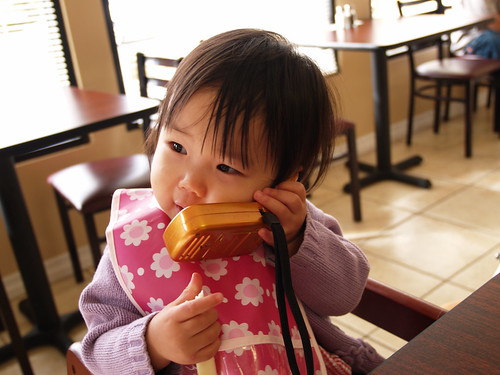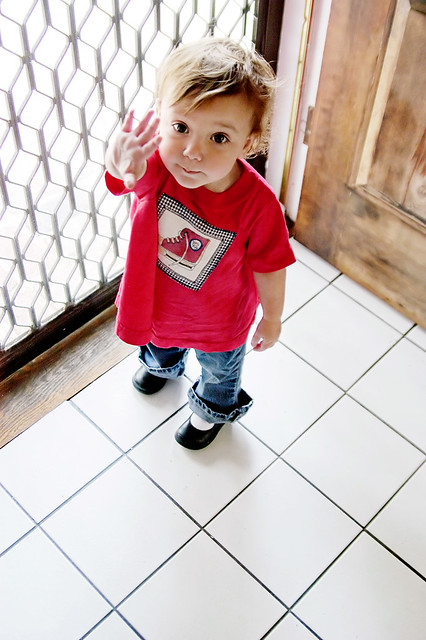Why You Won’t Learn Like a Child
It’s not that you can’t learn like a child, it’s that you won’t. You’re not willing to. Not because you aren’t committed, or aren’t smart enough, but because you’re an adult with a little bit of self-respect. And you get frustrated.
Have you ever hung out with a crazy friend who will go up to any stranger and say anything, seemingly without inhibitions? It’s awkward but also awe-inspiring, because it opens your eyes to how much your own inhibitions prevent you from doing and experiencing. This is sort of how I feel about my daughter as I watch her simultaneously acquire English and Chinese. Like all toddlers, she is awesome in so many ways that I feel that 99% of adult learners will not let themselves be.
You want to acquire language like a child? Here’s a list of things to do.
- Be told something is useful. Shrug it off and discard it because it’s boring and tackle something fun. [I see learners of Chinese tackle the HSK word list every day because they see it as “useful.” A child would not do this.]
- Say something wrong. Be corrected. Say the same thing wrong again. Be corrected. Say the same thing wrong again. Be corrected. Etc…. and yet never lose the desire to keep communicating. [This is perhaps one of the most amazing things that kids can pull off. They know no shame, feel very little frustration, and when it comes to language-learning, that makes them invincible. They’ve never learned a language before, so have no idea “how they’re doing at it,” and don’t care.]
- Ask how to say something, forget two minutes later. Ask again. Forget 3 minutes later. Ask again. Forget one minute later. Ask again. Etc…. [Adults, quite simply, get quite embarrassed when they keep forgetting something that they feel they should be able to remember. Everyone has a limit, and eventually adults will get too embarrassed to keep asking.]
- Say something simple. Repeat it. Again and again, until your conversation partner is visibly agitated. Do the same thing the next day. You’re locking that in.

(Yeah, I’m in the middle of a non-sensical conversation with my mom, but she’ll wait.
photo: mliu92) - Repeat something that you’ve just been told in order to confirm it. Then do it again. And again. Because why not do a triple or quadruple confirmation? You’re locking that in too.
- Say a word wrong, and get corrected on your pronunciation. Try to say it correctly, but fail. Shrug it off and doggedly continue with your incorrect pronunciation for now, because you know they understand what you mean (and hey, you’ll get it eventually!).

(Stop. I call it “pasgetti.” Now you just deal with that, and let’s move on.
photo: sesameellis) - Ask how to say something. Discover the word is hard, and just dismiss it, as if you never really wanted to learn it anyway. Give your dad a withering “I’m going to pretend you didn’t just say that” look. [Adults will sometimes postpone difficult vocab, but very often, they’ll bite off more than they can chew rather than “retreat” and live to fight another day. My daughter repeatedly dismisses the English word “electricity.” In Chinese, “电” is easy.]
- Tell your teacher super basic information all the time that your teacher obviously already knows. It’s like telling your Spanish teacher how to conjugate “estar,” or telling your math teacher about the Pythagorean Theorem. [They don’t need you to tell them this, but telling them helps you.]
- Talk and talk, even though you know you’re not making any sense. Use body language, tone of voice, and context to communicate something, anything. Then wait for the listener to try to make sense of that train wreck of a message, and just take it from there. Feel no shame.
- Make so little sense when you talk that you confuse your listeners. When they express their confusion, laugh at them. Then continue to not make sense if you feel like it.

If you can do all these things as a language learner, then congratulations! You are a rare learner indeed (or maybe roughly three years old?). You will learn quickly (if you don’t get shunned by too many native speakers for not acting “normal”).
But even if you can’t do these things, adults have lots of advantages over children, and no one expects you to learn like a child. Different ages call for different learning strategies. (But it doesn’t hurt to be just a little reckless in your learning, either.)

Nice one! There are lots of thnigs we can learn from children and it’s niteresting to analyse differences between child and adult learning that are not related to biological age. Still, regardless of the reason for it, child learning and adult learning are, in practice, two completely different things.
I think learning a new language makes us a bit like children, though, but this isn’t really what you talk about here. Not knowing a language puts us back in our development and makes us stupid, ignorant and clumsy. But we’re still adults. I find this confusing/frustrating situation quite interesting and I wrote more about it here: http://www.hackingchinese.com/growing-up-as-a-learner-of-chinese/
I think the bit about getting shunned by native speakers is the key. A young child’s learning strategies require a level of patience that you really can’t expect out of anyone except family or paid professionals.
I am constantly thinking of new ways to quicken and improve my Chinese learning, but due to some the exact reasons you mentioned above, I sort of became sour on the idea of learning like a child. I had pretty much decided that it WASNT possible. However, seems that you made a super important distinction here; it’s not that it’s impossible, it’s that you have to be willing to do it (and free of any inhibitions!). I think this also might explain why so many of the best speakers of Chinese tend to be easy going, artistic guys (大山、朱力夫、等等). They just don’t care about inaccuracy, and instead, focused their energy on communicating, listening, and taking in as much Chinese as possible. 大开眼界了!这么好的帖子 谢谢你!
In learning a language, sometimes you just need to stop caring about how you look or sound and act like a doofus.
Often I question my own inhibitions in learning Chinese. Although my reading comprehension is advanced, my speaking is still somewhat stilted and halting. This is due to a lack of practice. I am always reluctant to initiate conversation, but always welcome a willing listener. Often I’ve been accused of learning Chinese like a Chinese student who learns English, that is, using study methods that are very passive and internalized. In other words, I’m not effectively getting it out there and just letting the chips fall where they may – just like kids. I joke and say, I’ve adopted the Chinese habit of exceptional prudence and pragmatism. In all seriousness, adults require to use methods and techniques that are sound and within reason. An adult would have a more analytic approach instead of a tactile one as children naturally adapt.
I always thought those that argued adults needed to learn a foreign language like children learn their first language were slightly off their rockers. There aren’t many proponents, thankfully, but they are out there. Yes, pun intended.
Hi John, great post and very funny. I can tell you have kids, your description of their learning is bang on! I currently have one son aged 2 who is learning English from me and some mandarin from mum. His pronunciation is laughable but he always endeavours!
I can’t add much to the praise except to say you wrote a very insightful and funny article. I aspire to free myself of the inhibitions that slow my learning.
Yes. Enjoy the language and let that enjoyment show. Often the interlocutor will join the game – at least for a while.
There is an article written by J. Marvin Brown, called “Learning languages like children”, in which he addresses this topic. You can find it in the ALG (Automatic Language Growth) site.
Hi John, I stumbled onto your blog from your piece on why studying Chinese is so hard. This piece I find spot on, and I find myself smiling as I recall the times I would correct my train-obsessed 4 year old son’s tones over and over: “huô chē!… Huô Chē! HUÔ not HUÒ!” And he never once gets annoyed with being corrected. Being his only source of Chinese instruction (his Dad is German, and he goes to an English kindergarten in Belgium where we live), I worried a lot about how I alone can teach my child to speak Mandarin properly and by that I mean hitting those tones with 100% accuracy. My husband’s tones still suck after 7 years (could be related to his tone deafness – he sings terribly) and in school the the only way we learnt to pronounce properly was rote drilling during every chinese period, forced to repeatedly recite (as a class) the same passage over and over and over if 老师 did not like what she heard. This was about 6 hours a week for 6 years of elementary school. I think perhaps the way we Chinese learn the tones is kinda like how little kids are expected to!
I remember posting in Chinese on Chinesepod and being obliterated with comments about my errors. To which I responded in crazier Chinese. 不管别人怎么想,加油加油!
Yes, we don’t have all the time the children have to practice, but we do understand rules more then they do.
https://www.fluentsimple.com/
[…] she hoped there was some trick or pattern she could learn. There is another option of course: to learn like a child. Children, immersed in the language environment don’t “memorize” tones per se; […]
[…] learned: a lot can be learned in one year. Adults may not typically be able to learn like children, but it’s still inspiring to see what’s […]
[…] the meantime, beginners, do not despair! You’re not a child, and you won’t learn like one, but you can still learn Chinese. Just […]
That is me.
My friends always pretend they don’t know me XD.
A key thing that children don’t have but which adults do is exacerbated self-importance and the almost pathological need for positive feedback and reinforcement — this is the BIGGEST deal breaker in language learning. Adults are way too busy constantly evaluating their performance, counting “frequent flyer miles”, premiums, discounts and gold medals, and if we can’t prove it to ourselves that we are champions then we give up in order to save face. “Instead of being a loser I’d rather not play at all”. Preschool children are mostly immune to this cultural programming but they will ‘download’ all of it when they get to school and from that point on they’ll gradually start behaving more like their parents.